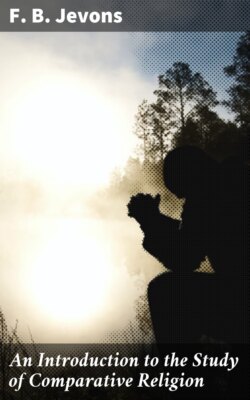Читать книгу An Introduction to the Study of Comparative Religion - F. B. Jevons - Страница 5
На сайте Литреса книга снята с продажи.
IMMORTALITY
ОглавлениеTable of Contents
The belief in immortality is more prominent, though less intimately bound up with religion, amongst uncivilised than it is amongst civilised peoples. In early times the fancy luxuriates, unchecked, on this as on other matters. It is late in the history of religion that the immortality of the soul is found to be postulated alike by morality and religion. The belief that the soul exists after death doubtless manifested itself first in the fact that men dream of those who have died. But, were there no desire to believe, it may be doubted whether the belief would survive, or even originate. The belief originates in desire, in longing for one loved and lost; and dreams are not the cause of that desire, though they are one region in which it manifests itself, or rather one mode of its manifestation. The desire is for continued communion; and its gratification is found in a spiritual communion. Such communion also is believed to unite worshippers both with one another and with their God. Where death is regarded as a disruption of communion between the living and the departed, death is regarded as unnatural, as a violation of the original design of things, which calls for explanation; and the explanation is provided in myths which account for it by showing that the origin of death was due to accident or mistake. At first, it is felt that the mistake cannot be one without remedy: the deceased is invited "to come to us again." If he does not return in his old body, then he is believed to reappear in some new-born child. Or the doctrine of rebirth may be satisfied by the belief that the soul is reincarnated in animal form. This belief is specially likely to grow up where totem ancestors are believed to manifest themselves in the shape of some animal. Belief in such animal reincarnation has, in its origin, however, no connection with any theory that transmigration from a human to an animal form is a punishment. Up to this point in the evolution of the belief in immortality, the belief in another world than this does not show itself. Even when ancestor-worship begins to grow up, the ancestors' field of operations is in this world, rather than in the next. But the fact that their aid and protection can be invoked by the community tends to elevate them to the level of the god or gods of the community. This tendency, however, may be defeated, as it was in Judæa, where the religious sentiment will not permit the difference between God and man to be blurred. Where the fact that the dead do not return establishes itself as incontrovertible, the belief grows up that as the dead continue to exist, it is in another world that their existence must continue. At first they are conceived to continue to be as they are remembered to have been in this life. Later the idea grows up that they are punished or rewarded there, according as they have been bad or good here; according as they have or have not in this life sought communion with the true God. This belief thus differs entirely from the earlier belief, e.g. as it is found amongst the Eskimo, that it is in this world the spirits of the departed reappear, and that their continued existence is unaffected by considerations of morality or religion. It is, however, not merely the belief in the next world that may come to be sanctified by religion and moralised. The belief in reincarnation in animal form may come to be employed in the service of religion and morality, as it is in Buddhism. There, however, what was originally the transmigration of souls was transformed by Gotama into the transmigration of character; and the very existence of the individual soul, whether before death or after, was held to be an illusion and a deception. This tenet pushes the doctrine of self-sacrifice, which is essential both to religion and to morality, to an extreme which is fatal in logic to morality and religion alike: communion between man and God—the indispensable presupposition of both religion and morals—is impossible, if the very existence of man is illusory. The message of the missionary will be that by Christianity self-sacrifice is shown to be the condition of morality, the essence of communion with God and the way to life eternal … 34–69
